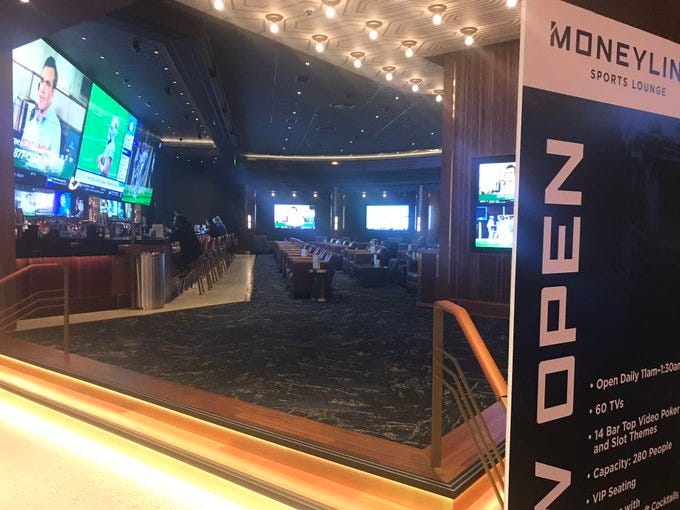Michigan on verge of joining national sports betting movement
 Craig Mauger
Craig MaugerLansing — Michigan took major steps Wednesday toward legalizing sports betting and online gaming, potentially joining a national push to allow and tax wagers on athletic events.
The Michigan Senate voted 35-3 in favor of bills to allow sports betting and online gaming through the state's casinos. The Michigan House then voted by wide margins to send nine of the 10 bills to Gov. Gretchen Whitmer for her expected signatures.
A 10th bill involving sentencing guidelines for violations of the proposed fantasy sports law was held up on a technicality and is expected to be voted on in early January.
“I look forward to being up hopefully by about March,” said Rep. Brandt Iden, the Oshtemo Township Republican who championed the bill package. “I’ve had conversations with Gaming Control. They think maybe 60 to 90 days to promulgate the rules.”

If Whitmer signs the bills into law, Michigan would join 17 other states that have legalized some form of sports betting, said Jill Dorson, who's been tracking the policy development for Sports Handle, a sports betting industry news site.
The 17 states include two of Michigan's neighbors, Indiana and Illinois. One of the key lawmakers working on the bills, Sen. Curtis Hertel, D-Meridian Township, said legal sports betting could be operational in Michigan by college's basketball annual tournament in March.
States have seen legalizing and taxing sports wagers as a way to bring in revenue, Dorson said.
Frank Fantini, CEO of Fantini Research and publisher of the Dover, Delaware-based Fantini’s Gaming Report, said lawmakers across the country have had a similar approach on the matter: "Everybody else is doing it. We should do it too."
The "momentum" behind legalizing sports betting had been aided by institutional sports organizations beginning to support it and the growing popularity of daily fantasy sports, Fantini said.
The extent of the tribal casinos' involvement in the new gaming options sets Michigan apart from other states that have passed similar legislation, Iden said.
“Of all the states that have adopted, none have a tribal component to the extent that Michigan has,” Iden said. “With 23 tribal casinos, we are the largest state that has adopted this.”
The three senators who voted against the sports betting and online gaming bills were Sens. Ed McBroom, R-Vulcan, Jim Runestad, R-White Lake, and Roger Victory, R-Hudsonville.
McBroom called the expansion of gaming a "huge step" to further the harm done by gambling. He said the state was "addicted" to obtaining people's money.
"The business of gambling does everything it can to take the largest possible legal amount of money from every user it can.” he said.
Hertel, the Democratic lawmaker, countered that residents are already gambling in Michigan whether it's legal or not.
"I am of the belief that providing a legal, safe and regulated option that actually brings in money for the state is a good thing," Hertel said.
The movement in favor of sports betting has played out across the country in the 19 months since the U.S. Supreme Court struck down a law that banned betting on sporting events in many states.
"They basically opened up the floodgates," as Fantini said.
Under Michigan's bill, the state would be able to grant sports betting operating licenses to those who already have casino licenses or Native American tribes that offer gaming through their casinos. Under the bills, the casinos could have onsite sports betting operations but could also offer online sports betting platforms to solicit wagers.
Michigan's tax rate for sports betting would be 8.4% at the state's 23 tribal casinos and 11.75% at the three Detroit casinos, a figure that reflects the 3.25% tax imposed by the city.
The proposed tax rates for online gaming would be levied at tiers ranging from 20% to 28%, based on revenue, with higher earners assessed higher rates. The high mark would increase to 31.25% for Detroit casinos because of the 3.25% city tax
Iden had originally proposed an 8% tax for online gaming. Iden said Whitmer asked for a 15% tax on sports betting and a 40% tax on internet gaming.
The package could increase the School Aid Fund by $35-50 million through sports betting tax revenue in the first year and upwards of $100 million once internet gaming tax revenue is added, Iden said.

Whitmer spokeswoman Tiffany Brown called the legislation on Tuesday "a good, bipartisan solution" made possible by "working together on a complex issue."
An analysis of the sports betting bill from the Senate Fiscal Agency said it was unclear whether the bill would "generate new gaming activity or trade-off with existing activity."
But Hertel said the analysis didn't reflect the latest changes made to the legislation. Hertel projected the state would end up making between $10 million and $50 million per year from sports betting and online gaming.
Hertel said he expected every casino in Michigan eventually to offer some form of sports betting.
"I think it would be a competitive disadvantage not to have it," he said.
The legislation is going to bring traffic to the state's casinos, said Jacob Miklojcik, president of Michigan Consultants, a Lansing-based firm that works on economic development matters including casinos.
"It's going to be popular," Miklojcik said.
In October, MGM Grand Detroit opened its Moneyline Sports Lounge, which for now is serving as a sports bar, complete with 60 televisions, a capacity of 280 and three sections of VIP seating. The lounge is located off the front entrance to the casino near the hotel lobby, and casino officials hope it will become a major attraction when the state legalizes sports betting.
Eventually, the sports betting and online gaming bills would allow for in-game, online proposition bets that cover subjects outside of just the basic outcome of a game, like which team will score first or how a specific drive will end.
The Michigan Senate also voted 35-3 in favor of another bill that sets up regulations for fantasy sports contests.

The Senate approved another gaming bill that would alter the law that guides Detroit's three casinos. Among the changes, that bill would allow those with financial interests in the casinos to begin making political contributions at the state level in Michigan.
The ban on political contributions has been in place four about two decades since Michigan voters approved a ballot proposal to allow for casinos in Detroit. In response to that proposal, lawmakers enacted a ban on political contributions in 1997.
Staff Writer Beth LeBlanc contributed.
cmauger@detroitnews.com